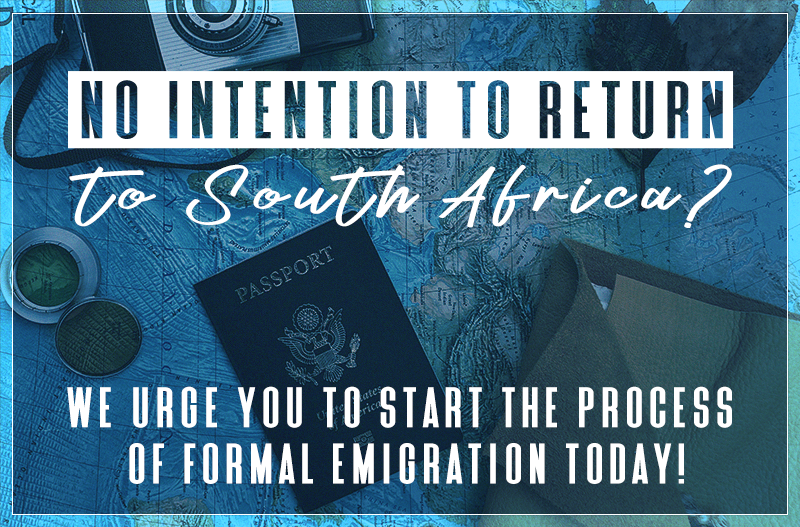Deadline missed, now what?
It’s official. Formal emigration as we know it, has come to an end as of 28 February 2021, what now?
On the 15th of January 2021, the President assented to the Taxation Laws Amendment Act No. 23 of 2020 (“TLAA”), which was subsequently promulgated on 20 January 2021.
From the 1st of March 2021 retirement annuity funds will be locked in for a minimum of three consecutive years. South African pension and provident fund members are only allowed to access their funds at retirement, but formal emigration enabled South African expats to access their funds at an earlier age, once the process of formal emigration has been finalised. Many South Africans make use of their retirement lumpsum to financially assist them in the early years of emigration or to set them up for financial success in a new country. Should you need the funds, take note of the deadlines below.
Before 28 February 2021
If the exchange control emigration application is successfully submitted to the SARB before 28 February 2021 and approved before 28 February 2022, you would be able to still access your retirement funds under the old dispensation.
Post 1 March 2021
As of 1 March 2021, South African expats will only be able to access their retirement funds if they can prove that they have been a non-resident for tax purposes for three consecutive years.
What will enable one to be classified as a non-sa-tax resident?
To determine your tax residency status, the following analogy explains it best.
Consider a scenario of basic training where a Major is trained by a Captain and if the Major can overcome the obstacle course he or she will be allowed to proceed to the next rank. In the below analogy the Major will be the South African Expat and the Captain will be Sars. The obstacle course will be the ordinary residence and physical presence test that will determine the tax status of the applicant wishing to encash his retirement annuities.
The obstacle course will ultimately consist of two parts:
- The ordinary residence test
- The physical presence test
Let us have a look at the first part:
When assessing whether a person will be determined as an ordinary resident in South Africa the following factors will be considered.
- An intention to be a ordinary resident in South Africa
- Your most fixed and settled place of residence
- Your habitual abode, for example, where are your memberships and subscriptions
- Where do you work and where is your family living
- Your working status in South Africa, are you a permanent employee or do you have a work visa
- The location of your belongings
- Your nationality
- Application for permanent residence, if you are not living in South Africa, do you have permanent residency elsewhere.
- Periods abroad, what % on the days in the year do you spend offshore
- Frequency and reasons for visit, how often do you visit South Africa and what are the reasons for visiting?
The above mentioned part 1 of the obstacle course should be examined as a whole and over a period of time. A before and after difference should be determined to clarify the difference in scenarios.
If part 1 of the obstacle course, the ordinary residence test, determines you as a non-sa-tax resident the Captain will move you on to Part 2, the physical presence test. In the physical presence test you will be tested on the following: Have you been in South Africa for…
- More than 91 days in the year of assessment
- More than 91 days per year for five years
- More than 915 days during a five year period
The above mentioned periods are not needed to be consecutive and there can be several intermittent periods. Some fine print in the rules also includes the below:
- When doing the physical presence test and counting the days, days spent traveling in South Africa are not counted as days in South Africa.
- To determine the days spent outside South Africa, only days of which you are not inside the South African borders will count.
- A person who is determined to be a resident based on the physical presence test ceases to be a resident if they have spent more than 330 consecutive days outside the borders of South Africa.
Should the Major pass the above obstacle course he will be classified a non-sa-tax resident. The National Treasury has confirmed that the three years mentioned above can start before 1 March 2021. This means that if on 1 March 2021 the member already met the requirements and was not a South African tax resident for a period, they do not need to start counting the three years again from 1 March 2021.
The[1] new legislation also implies that provident and provident preservation fund members will only be able to take a maximum of one-third of their unvested retirement fund assets in cash at retirement unless their total unvested retirement fund assets are R247 500 or less. The remainder will have to be used to purchase an annuity. This is in line with the benefits allowed in pension funds and retirement annuities.
A new process will be implemented to assist South Africans who emigrated to encash the lump sum of their retirement funds. The new process is not set-in stone but will most likely include taking into consideration the policy provider’s requirements, SARS requirements, the need for documentary supporting evidence and proof of non-residency status for an uninterrupted period of three years.
Formal emigration as we know it, will change, but RandTangle will guide South Africans who live abroad to navigate through these uncertain times.
Sources: Smith, C. 2021. Ramaphosa has signed a 3-year retirement fund lock-in into law – so what does this mean? News article. News24. https://www.news24.com/fin24/economy/ramaphosa-has-signed-a-3-year-retirement-fund-lock-in-into-law-so-what-does-this-mean-20210129. Date of access: 12 February 2021.
 In the left corner, weighing in at a substantial amount due to obvious reasons, is the South African Government. In the right corner we have those who left the South African soil and – these expats are shielding their hard earned international money like a hen protecting her chicks from a the hungry Government cat.
In the left corner, weighing in at a substantial amount due to obvious reasons, is the South African Government. In the right corner we have those who left the South African soil and – these expats are shielding their hard earned international money like a hen protecting her chicks from a the hungry Government cat.
